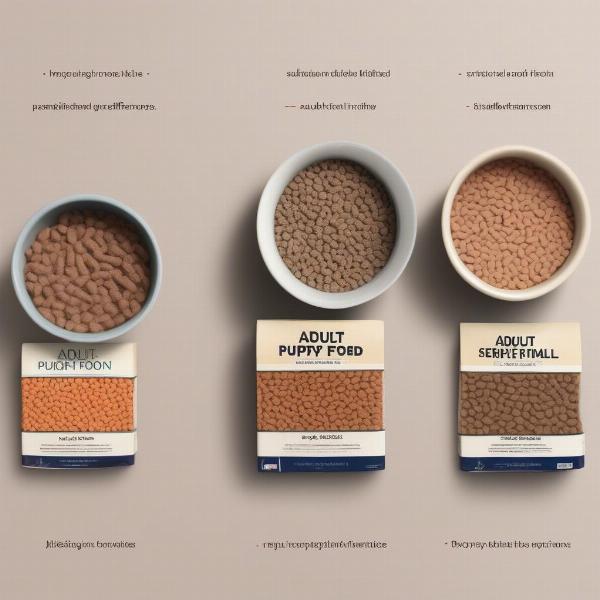Rolled dog food, also known as kibble, is the most popular type of dog food on the market. It’s convenient, affordable, and comes in a wide variety of formulas to suit different breeds, ages, and health needs. This guide will explore everything you need to know about rolled dog food, from understanding the ingredients to choosing the best option for your canine companion.
Understanding Rolled Dog Food Ingredients
Rolled dog food is typically made from a mix of dry ingredients that are ground, blended, and then cooked into kibble. Common ingredients include meat and meat by-products, grains, vegetables, fruits, fats, and essential vitamins and minerals.
Decoding the Label
Understanding dog food labels is crucial. Look for the guaranteed analysis, which lists minimum percentages of protein, fat, fiber, and moisture. The ingredient list is also important, as it shows the ingredients in descending order by weight.
Choosing the Right Rolled Dog Food
With so many options available, selecting the best rolled dog food can be overwhelming. Consider your dog’s age, breed, activity level, and any specific health requirements.
Life Stage Formulas
Puppy, adult, and senior dog formulas are tailored to meet the nutritional needs of dogs at different stages of life. Puppies require higher levels of protein and fat for growth, while senior dogs benefit from lower-calorie formulas with added joint support supplements.  Dog food for different life stages
Dog food for different life stages
Breed Specific Formulas
Some dog food brands offer formulas designed for specific breeds, taking into account their unique nutritional needs and predispositions to certain health conditions. For example, large breed formulas may contain ingredients to support joint health.
Health-Focused Formulas
If your dog has a specific health condition, such as allergies, digestive issues, or joint problems, you may need a specialized formula. Veterinarian-prescribed diets are also available for more serious health concerns.
Storing and Serving Rolled Dog Food
Store rolled dog food in a cool, dry place in an airtight container to maintain freshness. Always follow the feeding guidelines on the package, adjusting portions as needed to maintain your dog’s ideal weight. red barn rolled dog food
Common Questions about Rolled Dog Food
Is rolled dog food complete and balanced? Most commercially available rolled dog foods are formulated to be complete and balanced, providing all the essential nutrients your dog needs. pumpkin yogurt dog treats
“Choosing the right rolled food can significantly impact your dog’s health and wellbeing. Pay attention to the ingredients and consult your vet for personalized recommendations,” says Dr. Emily Carter, DVM.
The Benefits and Drawbacks of Rolled Dog Food
Rolled dog food is convenient, shelf-stable, and relatively affordable. However, it can be less palatable than wet food and may contain lower moisture content, which can be a concern for some dogs. my big dog killed my little dog
“While convenient, it’s essential to choose high-quality rolled food that prioritizes natural ingredients and avoids fillers,” adds canine nutritionist, Sarah Johnson.
Conclusion
Rolled dog food offers a convenient and affordable way to feed your furry friend. By understanding the ingredients, choosing the right formula, and storing it properly, you can ensure your dog receives the nutrition they need to thrive. urinary food for dogs
FAQ
- How much rolled dog food should I feed my dog? Follow the feeding guidelines on the package and adjust based on your dog’s weight and activity level.
- Can I mix rolled dog food with wet food? Yes, many dog owners mix wet and dry food.
- How long does rolled dog food stay fresh? Unopened rolled dog food typically has a shelf life of about a year. Once opened, store it in an airtight container.
- What are some signs of a good quality rolled dog food? Look for whole meat sources as the first ingredient, avoid artificial colors and flavors, and choose a formula appropriate for your dog’s life stage and health needs.
- Is rolled dog food good for all dogs? While suitable for most dogs, some may have allergies or sensitivities to certain ingredients. Consult with your vet if you have concerns.
- Can I give my dog treats if they eat rolled dog food? Yes, treats can be given in moderation.
- What should I do if my dog refuses to eat rolled dog food? Try switching to a different flavor or formula. citric acid and dogs
ILM Dog is your trusted resource for expert dog care advice. We cover everything from breed selection and health to training and nutrition. Our passion is helping dog owners provide the best possible care for their canine companions. For personalized guidance, contact us via email at [email protected] or call us at +44 20-3965-8624. ILM Dog provides expert advice on various aspects of dog care, including Breed Selection, Health, Training, and Nutrition.